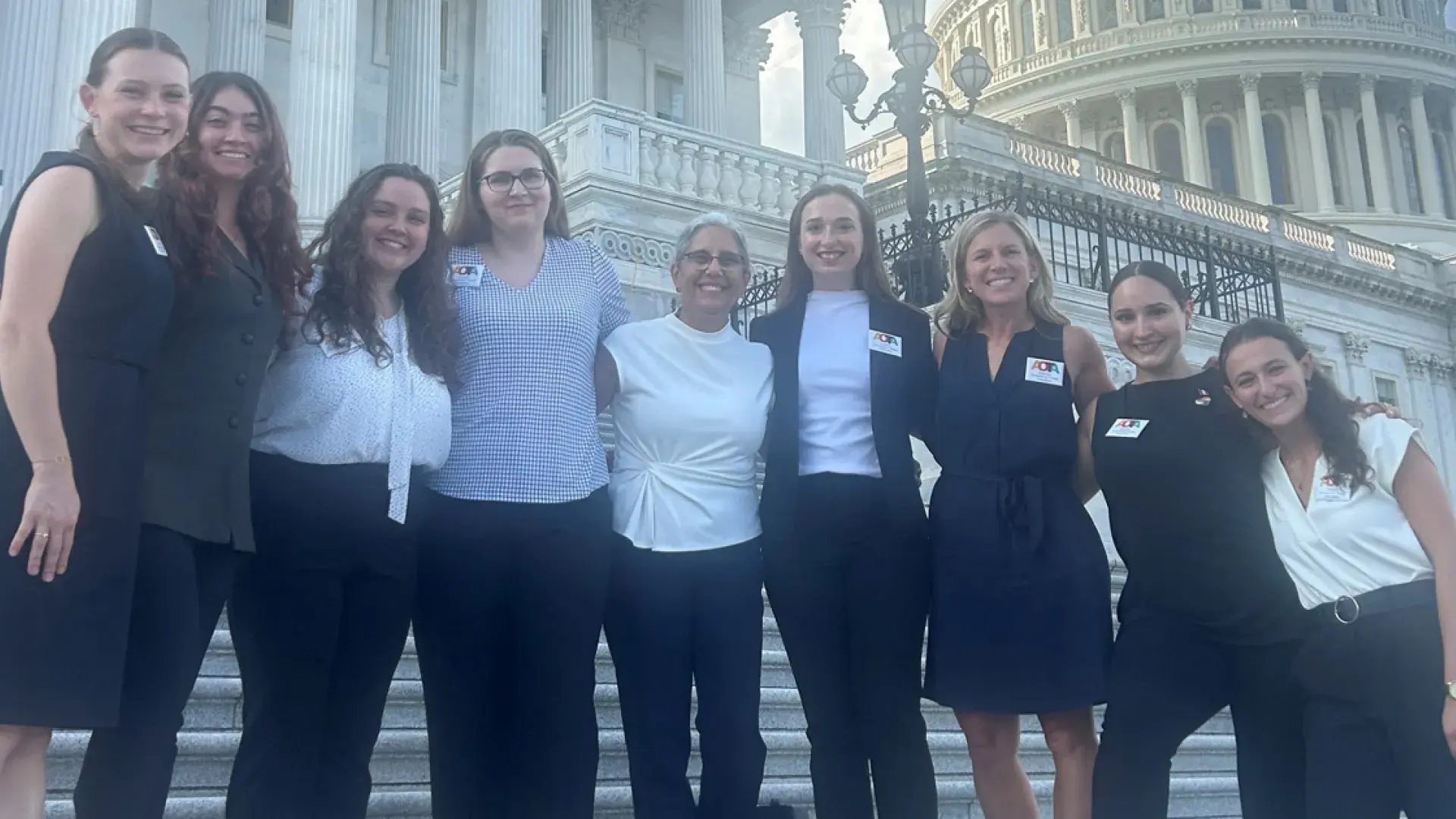
Entry-Level Doctor of Occupational Therapy advocate for their profession
Hope Hilsenrath is used to taking a hands-on approach to learning, but on September 20, she and six other second-year Entry-Level Doctor of Occupational Therapy students had a completely different type of experiential learning during the American Occupational Therapy Association’s annual Hill Day in Washington, D.C.
She joined Karina Absalon, Emily Cudhea-Pierce, Emily Dawkins, Elizabeth Lawlor, Kaelyn Mills, and Gianna Ruiz, along with OT department members Patti Peterson, Mary O’Donnell and Interim OT Department Chair Sarah McKinnon. All joined over 350 practitioners, educators, and students to advocate for the profession on three key topics — reducing Medicare cuts, increasing OT mental health services, and increasing access to telehealth.
“The MGH IHP OTD program equipped me with the skills to effectively advocate for our profession and communicate the significance of three legislative bills to both legislators and fellow occupational therapists,” explained Hilsenrath.
The MGH Institute team met with the staffs from Massachusetts Representatives Richard Neal, Stephen Lynch, William Keating, Ayanna Pressley, and Massachusetts Senator Ed Markey, along with staffs of congressional members from Florida, Maryland, New Mexico, and Nevada to urge the adoption of policies to reverse Medicare cuts and protect critical OT services. Since 2021, occupational therapy practitioners have faced significant cuts to Medicare payments, with a phased-in 9% reduction expected by 2025 due to budget neutrality policies. These cuts, along with freezes since 2013 and a 15% reduction for services provided by occupational therapy assistants in 2022, have severely reduced payment rates. In their meetings, they asked for support of legislation to provide an increase to Medicare payments by at least the rate of inflation before the end of the year, and for members of the House of Representatives to co-sponsor the Strengthening Medicare for Patients and Providers Act (H.R 2474).
Another bill that the group worked to garner support for is the OT Mental Health Parity Act (H.R.8220/S.1592), which would require the Secretary of Health and Human Services to provide education on OT’s role in supporting beneficiaries with mental health or substance use disorders, without changing benefits or scope of practice. Occupational therapy is a covered service under Medicare for individuals with mental health diagnoses, but it is underutilized when addressing a patient’s psychosocial needs. Since it only involves education on existing services, the bill has no additional cost, and it is part of the bipartisan Better Mental Health Care, Lower-Cost Drugs and Extenders Act.
The team also requested support for the Expanded Telehealth Access Act (H.R.3875/S.2880) to permanently establish occupational therapy practitioners (OTPs) as Medicare telehealth providers. OTPs were allowed to provide telehealth services to Medicare beneficiaries during the pandemic, but this waiver expires at the end of this year. The Centers for Medicare and Medicaid Services (CMS) does not have the authority to make OTPs permanent telehealth providers, so without Congressional action, OT telehealth for Medicare will end. Telehealth has been especially beneficial for individuals in rural or underserved areas, and video home visits allow OTPs to address home safety issues that can't be identified in an office. Telehealth has also reduced delays in care, cancellations, and costs for Medicare beneficiaries.
"We are proud to have had such a strong representation from our occupational therapy department at AOTA Hill Day this year,” said McKinnon. “Our team's active participation reflects our commitment to advocating for the profession and the communities we serve. Engaging with lawmakers and voicing the essential role occupational therapy plays in healthcare is crucial to advancing policies that support both practitioners and the individuals who rely on our services.”
While the results of their efforts on Capitol Hill may not be evident right away, the experience of raising their voices on behalf of their profession was a powerful one for the contingent from MGH Institute.
“This experience demonstrated the importance and power of coming together to make real change on a legislative level,” said Hilsenrath. “It was so inspiring to be surrounded by a diverse community of passionate OTs.”
Do you have a story the Office of Strategic Communications should know about? If so, let us know.
